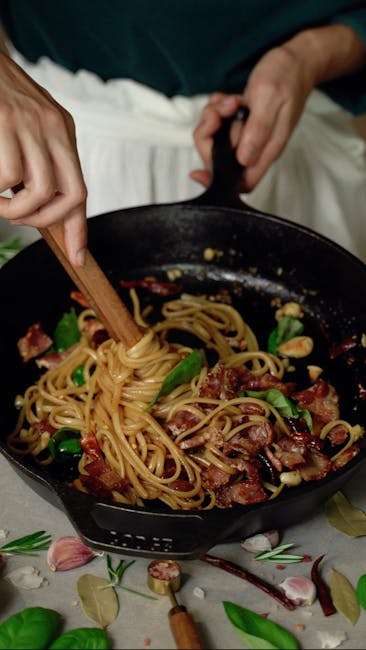The Benefits of Cooking with Cast Iron ?
Cooking is an art, and like any artist, your tools can make a world of difference. Among the various cookware options, cast iron stands out for its durability, heat retention, and versatility. Whether you’re a novice home cook or a seasoned chef, incorporating cast iron into your kitchen arsenal can enhance your culinary creations. In this blog post, we’ll explore the numerous benefits of cooking with cast iron and why it’s worth investing in this timeless kitchen staple.
Table of Contents
1. Introduction
2. Versatility of Cast Iron Cookware
3. Superior Heat Retention and Distribution
4. Health Benefits of Cooking with Cast Iron
5. Durability and Longevity
6. Easy Maintenance and Care
7. Conclusion
8. FAQ
Versatility of Cast Iron Cookware ?
One of the most appealing aspects of cast iron cookware is its incredible versatility. Whether you’re searing, sautéing, baking, roasting, frying, or even grilling, a cast iron pan can handle it all. Imagine making a perfectly crispy skillet cornbread or a juicy steak with a golden-brown crust—cast iron makes it possible.
Moreover, cast iron cookware can seamlessly transition from stovetop to oven, making it perfect for recipes that require both methods. This versatility not only saves time but also reduces the need for multiple pans, minimizing kitchen clutter.
Superior Heat Retention and Distribution ??
Cast iron is renowned for its exceptional heat retention and distribution capabilities. Once heated, it maintains a consistent temperature, ensuring even cooking throughout your dish. This quality is particularly beneficial for dishes that require a steady temperature, such as stews or fried foods.
When you use cast iron, you’ll notice that foods not only cook evenly but also develop a beautiful caramelization, enhancing flavors and textures. It’s the perfect tool for achieving that professional sear on meats and vegetables.
Health Benefits of Cooking with Cast Iron ??
Cooking with cast iron isn’t just good for your food; it’s also beneficial for your health. Unlike non-stick pans that can release harmful chemicals when overheated, cast iron is free from synthetic coatings. Additionally, cooking with cast iron can increase the iron content of your food, which is particularly advantageous for those with iron deficiencies.
As you cook with cast iron, trace amounts of iron leach into your food, providing a natural supplement that can contribute to your daily iron intake. It’s a simple way to boost nutritional value without any extra effort.
Durability and Longevity ?
Investing in cast iron cookware is investing in a lifetime of quality cooking experiences. Cast iron is incredibly durable and can withstand high temperatures and heavy use. With proper care, a cast iron skillet can last for generations, making it a cost-effective choice in the long run.
Unlike other materials that may warp or degrade over time, cast iron only gets better with age. It develops a natural, non-stick patina that improves with each use, enhancing both performance and flavor.
Easy Maintenance and Care ?
While cast iron may seem intimidating due to its maintenance needs, caring for it is surprisingly simple. After cooking, simply clean your cast iron with warm water and a brush, avoiding soap to preserve the seasoning. Dry it thoroughly to prevent rust, and apply a light coat of oil to maintain its seasoned surface.
Over time, you’ll find that maintaining cast iron becomes second nature, and the rewards of a well-seasoned skillet—like effortless food release and enhanced flavors—are well worth the minimal effort required.
Conclusion
Cooking with cast iron offers a multitude of benefits that enhance both the culinary experience and the quality of your dishes. Its versatility, superior heat retention, health benefits, durability, and ease of maintenance make it a must-have in any kitchen. Whether you’re whipping up a quick breakfast or preparing a gourmet meal, cast iron cookware is a reliable companion that will elevate your culinary creations.
FAQ ?
Q: Can I use cast iron on an induction cooktop?
A: Yes, cast iron is compatible with induction cooktops because it is magnetic. Just be mindful of its weight to protect the cooktop’s surface.
Q: How do I prevent my cast iron from rusting?
A: To prevent rust, dry your cast iron thoroughly after washing and apply a thin layer of oil. Store it in a dry place, and avoid leaving it soaked in water.
Q: Is cast iron safe for acidic foods?
A: While cast iron can handle acidic foods, prolonged cooking with high acidity can degrade the seasoning. It’s best to limit the cooking time of acidic dishes or use a well-seasoned skillet.
Q: Can I use metal utensils with cast iron?
A: Yes, you can use metal utensils with cast iron. The seasoned surface is durable enough to withstand metal contact, but take care not to scrape too aggressively.
Q: How often should I season my cast iron?
A: Regular use and proper maintenance will keep your cast iron well-seasoned. However, if food starts sticking or the surface looks dull, it’s time for a re-seasoning.
